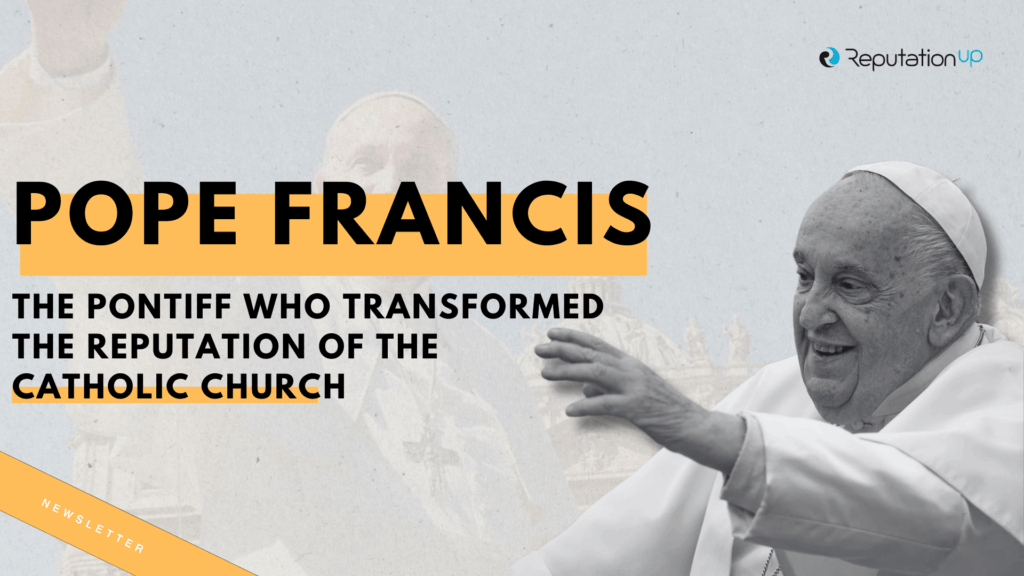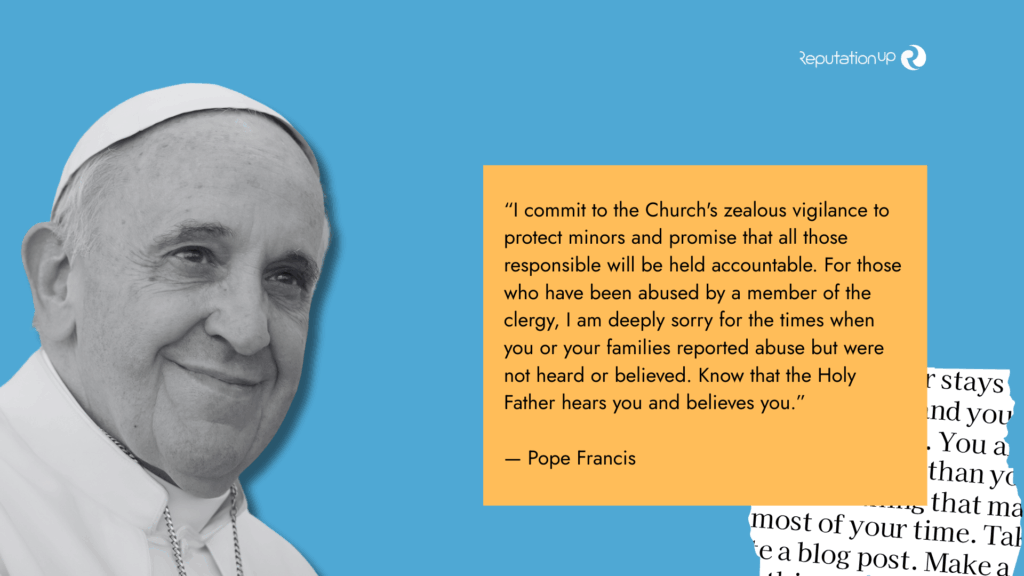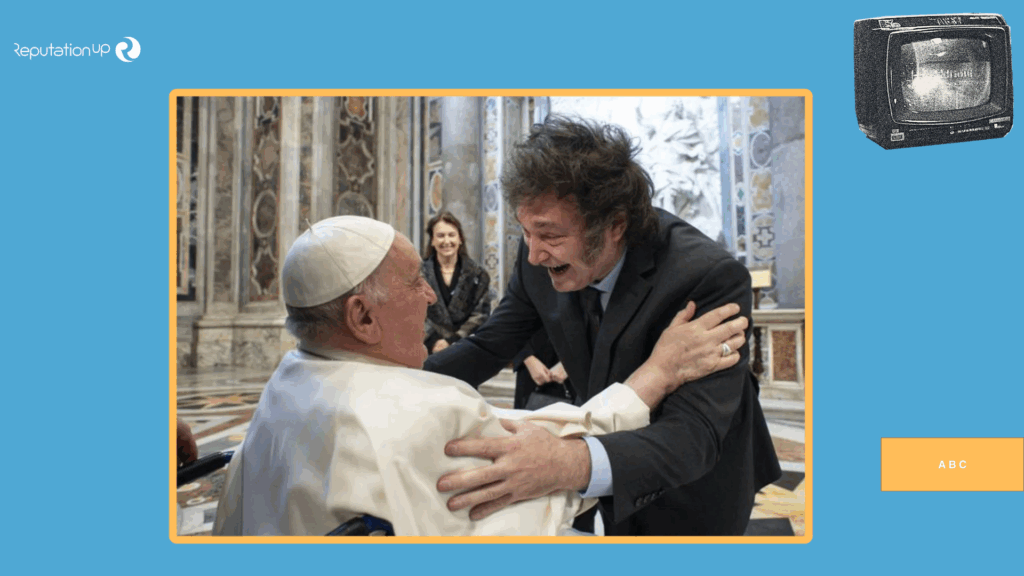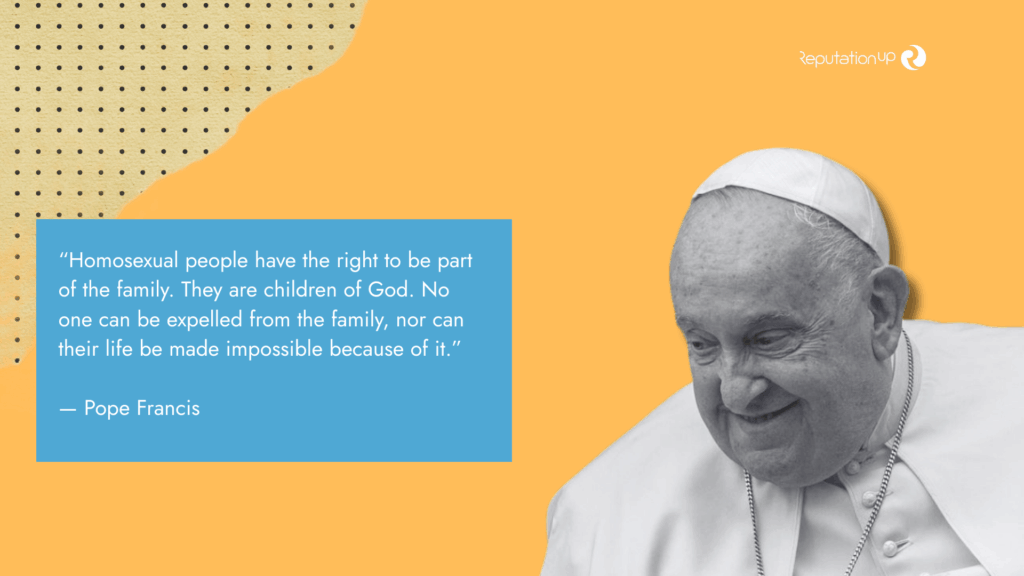The death of Jorge Mario Bergoglio marks the end of an era that transformed the image of the papacy and left a profound mark on the reputation of the Catholic Church globally. Francis didn’t just change his tone; he changed the narrative.

From religious leader to global ethical figure
Francis, the first Latin American Jesuit pope, came to the throne of St. Peter with a clear mission: to put the excluded back at the center of the Christian message. And he achieved this not only with symbolic gestures, but with strategic decisions that reshaped public perception of the Church in times of crisis.
Since his election in 2013 , he understood that the institution he led was suffering severe reputational damage: sexual abuse scandals , internal struggles within the Curia, and a disconnect with younger generations had undermined its credibility . His leadership was, therefore, a response to the wear and tear accumulated over decades.
A wounded reputation and the attempt at restoration
Francis took concrete steps to reverse that damage. He was the first pontiff to explicitly apologize to victims of clerical abuse and to order internal audits to enforce a zero-tolerance policy.
“I commit to the Church’s zealous vigilance to protect minors and promise that all those responsible wills be held accountable. To those who were abused by a member of the clergy, I am deeply sorry for the times when you or your families reported abuse but were not heard or believed. Know that the Holy Father hears and believes you.”
He didn’t just change norms: he transformed codes of conduct and visibility. He redefined what institutional forgiveness means, and he used his position not as a shield, but as a loudspeaker.

Communication, closeness and disruption
The transformation also affected his communication style. Francis abandoned the Vatican’s stilted speeches. He embraced spontaneity, empathy, and humanity as tools of leadership. He wasn’t afraid to improvise or tackle uncomfortable topics.
“It’s better to be an atheist than a bad Christian. How many times have we heard: ‘To be a Catholic like that, it’s better to be an atheist.’ That’s the scandal. It destroys you. It knocks you down.”
Her stance on reproductive rights also marked a turning point:
“Preventing pregnancy is not an absolute evil. In certain cases, like the one I mentioned about Pope Paul VI, it was clear. Abortion is not the least of evils. It’s a crime… It’s what the mafia does.”
Francis was disruptive because he connected with uncomfortable realities. In times of polarization, his tone was not populist, but pastoral . And that allowed him to position himself as one of the most respected moral voices of the 21st century.
Social justice against populism and the far right
One of the most revealing episodes of his impact on the international scene was his tense relationship with the Argentine president Javier Milei.
During her campaign, Milei called him “the representative of evil on Earth,” accusing him of promoting “communist” ideas and hindering the free market with his defense of social justice.
But the Pope, far from responding with hostility, opted for quiet diplomacy. He received Milei at the Vatican in February 2024. At that meeting, the president made a radical about-turn, calling him “the most important Argentine in history.”
The hearing between the two was much more than a political postcard. It represented a battle between two narratives: that of the common good versus that of extreme individualism.
In this context, the pontiff embodied a model of humanistic leadership that contrasted with the rise of hate speech, exclusion and ruthless adjustment.
This interaction highlighted how Pope Francis became a key figure on the geopolitical chessboard, a kind of moral counterpart to the logic of the unbridled market.
His way of communicating ideas — environmental ethics , inclusion , social justice — consolidated a personal brand aligned with the foundations of Political marketing: clarity of message , narrative coherence and emotional connection .

A Pope who rewrote the story of the Church
The great transformation Francis leaves behind is intangible, but powerful. The Vatican is no longer perceived as a purely doctrinal institution, but as an actor that can influence contemporary debates with a moral voice.
In the age of hyperconnectivity, his figure has become a cross-cutting symbol: for many believers, a close pastor ; for laypeople, an ethical leader; for analysts, a tool of ecclesial soft power.
“Homosexual people have the right to be part of the family. They are children of God. No one can be kicked out of the family, nor can their life be made miserable because of it.”
Although he didn’t change dogmas, he did achieve something more difficult: changing the tone, face, and institutional soul of Catholicism. And in doing so, he reached out to a new audience, especially young people, who felt alienated from traditional rites.
His presence on social media, his approachable language and his ability to interact with other religions and social causes made him a figure with a strong symbolic impact.

What now? The uncertain future of the Church and the upcoming conclave
The death of Francis leaves behind a Church that is different from that of 2013: more decentralized, more plural, and, above all, more challenged by the world around it.
The upcoming conclave, which will bring together 137 cardinal electors faces a key dilemma: whether to continue Francis’s reformist project or to chart a course of contention toward a more conservative stance.
Francis changed the rules of the game. He broke the unwritten tradition that reserved the red hat for European bishops and concentrated the composition of the College of Cardinals in previously marginal regions. Thanks to this, there are now strong candidates in Asia, Africa, Latin America, and North America.
These are the most prominent names in the race for the throne of St. Peter:
- Pietro Parolin (Italy): current Vatican Secretary of State. With a highly precise diplomatic profile, he is considered an effective manager of Holy See’s international relations. Although he supported Francis’s agenda, his style is more reserved and conservative. His strength: experience. His weakness: he represents the Italian old guard that Francis tried to dismantle.
- Matteo Zuppi (Italy): Archbishop of Bologna, very close to social movements and with a strong pacifist vocation. He was appointed by Francis to lead the peace mission in Ukraine.
His sympathy for the LGBTQ+ community and his closeness to the grassroots make him a reformist candidate, although some conservative sectors could veto him.
- Luis Antonio Tagle (Philippines): Prefect for the Evangelization of Peoples and former leader of Caritas. Charismatic and pastoral, he has been nicknamed “the Asian Francis.”
He represents a growing Church in Asia, although his management capacity has been questioned following internal restructuring. His election would imply an opening toward the global south.
- Pablo Virgilio David (Philippines): President of the Philippine Episcopal Conference, activist against state violence, and human rights defender. He has a strong ethical profile and is courageous in the face of political power. His closeness to the people and doctrinal consistency make him a serious figure, although he has a low media profile.
- Fridolin Ambongo Besungu (DR Congo): Archbishop of Kinshasa and a staunch voice against corruption in Africa. He represents a young and growing Church, although his conservative stance on same-sex marriage could be divisive.
- Gérald Cyprien Lacroix (Canada): Archbishop of Quebec, pragmatic and open to dialogue. He is very active in the context of secularization, which could be useful for reconnecting with the Western world. Although he faced past accusations of abuse—dismissed due to lack of evidence—his name remains on the list of papal candidates with internal support.
- Joseph Tobin (USA): Cardinal of Newark, a popular figure for his pastoral approach, multilingualism, advocacy for migrants, and strong international background.
His biggest obstacle: the historical resistance to having a pope from the United States due to its geopolitical influence.
- Robert Prevost (USA/Peru): Prefect of the Dicastery for Bishops, an American with strong roots in Latin America. He has been instrumental in the appointment of bishops and possesses a global vision. He represents institutional continuity from the previous pontificate.
- Tarcisius Isao Kikuchi (Japan): Archbishop of Tokyo and current head of Caritas International. With extensive experience in Africa, Asia, and interreligious dialogue, he could be a point of convergence between the Jesuit tradition and the dynamism of the Asian continent.
- Michael Czerny (Canada): Jesuit, expert on migration and social justice, with experience in Latin America and Africa. He is very close to Francis, although his membership in the Society of Jesus could cost him votes, given that not all cardinals want another Jesuit pope.
- Cristóbal López Romero (Spain/Morocco): Salesian with experience in Africa and Latin America. A staunch defender of dialogue with Islam, his election would represent a symbolic opening to the Muslim world and a globalized Church.
- Jean-Claude Hollerich (Luxembourg): A Jesuit with a strong presence in Europe and in the synodal process. A driving force of structural reforms, he could continue the path opened by Francis, although his European origins work against him in a context of decentralization.
- Péter Erdő (Hungary): A conservative jurist, closely aligned with traditional positions, his election would be interpreted as a counter-reform to what Francis promoted. Supported by sectors close to Prime Minister Viktor Orbán, he could polarize the conclave.
What’s at stake is not just a figure, but a direction: will the Catholic Church continue to project an image of closeness, dialogue, and symbolic openness, or will it return to a more doctrinal, structured, and conservative model?

